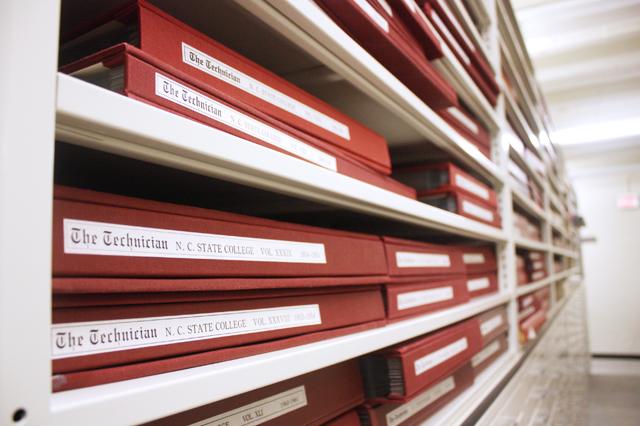The research faction of the library system known as Special Collections is charged with keeping the one-of-a-kind and fragile materials pertaining to the different specialties at the University, such as agriculture, engineering, design and more.
The Vault, as it is unofficially known within Special Collections, is where many of these materials are kept. Some of these include building plans for various structures on campus, departmental records and the entire run of the Technician.
“It is unique and one-of-a-kind,” Jennifer Baker, a research services associate in Special Collections, said.
The exact location of the Vault is a carefully-guarded secret, as much of the materials kept there are very valuable. However, it is open to any student who wishes to use it. Baker explained that all they have to do is email Special Collections to make an appointment.
“Anyone is allowed to use the materials. The only thing that might dictate that is if a donor donates a collection and puts a restriction on that,” Baker said.
Baker said that most of the students who use the Vault are graduate and doctoral students who are doing research.
“We’d like to see more undergraduates use it,” David Hiscoe, director of communication strategies at D.H. Hill Library, said.
According to Baker, Special Collections acquires the material that goes into the Vault in various ways, from private donations to record transfers from departments on campus.
The Vault’s materials can be used for a number of reasons, not just history research. Baker said architecture students come down to see the drawings and building plans that are housed in the collection.
“A lot of architecture students do a lot of computer-generated work. We have had lots of classes come in to see the original drawings,” Baker said. “They get to see how the drawings were originally done.”
Baker also spoke of an architecture student in Poland who was researching Dorton Arena, located on the Fairgrounds here in Raleigh, and wanted to do a scale model of it. The original building plans are located in the Vault and Special Collections was able to scan and send him copies.
The Vault is also perfect for history students who are interested in not only the history of the University, but also Raleigh in general.
“There’s 100 years of archival material which [history students] can use for research,” Baker said.
Hiscoe explained that they have the personal papers of the first female student body president at the University, which provides an insight into how female students were treated here years ago.
According to Hiscoe, the Vault is a wonderful resource that students can have access to with virtually no trouble at all. He said that it is a good opportunity for students “to use the original materials that no one else has access to, but N.C. State students can just walk in and grab.”
The Vault itself is kept at 50 percent humidity and around 65 degrees. Baker explained that a constant temperature keeps paper stable and less prone to degeneration, which is standard archive procedure.
It also uses expanding shelves to save space and maximize the amount of material that can be kept down there. The organization of the material is the Library of Congress system, which is exactly the same as in the stacks.
Some of the books are so old that they need attention to prevent them from falling apart and being unusable. Baker said there is always ongoing preservation, and some of the books have pink slips attached to them to indicate that attention is needed for them.
The Vault also contains every issue of the Technician since the beginning of its run. Each school year’s worth of issues is contained in a single volume. The pages are protected with a material called “mylar,” which is safer for them than lamination. Baker said that laminating applies heat to the page, but mylar seals the pages in plastic and works like a sheet protector so the pages can be removed if necessary.
Baker and Hiscoe stressed that any student can use these materials as long as they make arrangements with Special Collections. The research associates, like Baker, can assist students in finding the materials they need for whatever they are working on.








